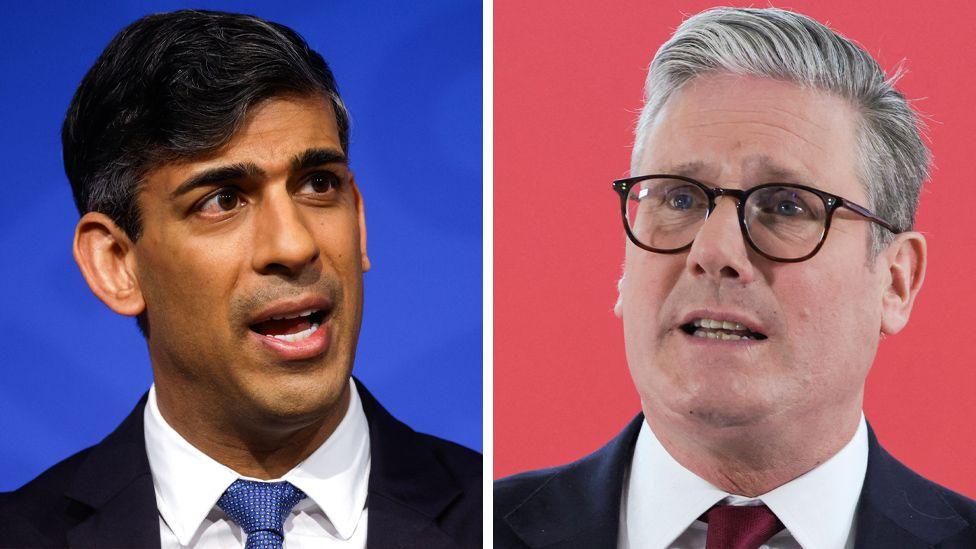Welcome to the Sunak and Starmer show

- Published
Welcome to the Sunak and Starmer show and welcome to the next four, five, six or seven months of your life.
Even if you pay only fleeting attention to the goings-on in UK politics, you have probably spotted we are seeing rather a lot more of the prime minister and the Labour leader Sir Keir Starmer.
This could begin to feel, perhaps it already feels, like a very, very long general election campaign.
On Friday, Rishi Sunak was talking to economics journalists while Sir Keir was talking to political journalists. Today, Mr Sunak is in London while his opponent is in the West Midlands.
In big picture terms, we are seeing a classic dynamic being road-tested by either side.
Next few years 'most dangerous' for UK, PM to warn
- Published13 May 2024
'Work to do' after local election losses - Sunak
- Published6 May 2024
Better the devil you know and be careful what you wish for, from the long time incumbent party of government.
Time for change, say the opposition.
Rishi Sunak, who was 44 yesterday and is the best part of 20 years younger than Keir Starmer, is attempting to personify the future.
“More will change in the next five years than in the last 30,” he claims.
“I’m convinced that the next few years will be some of the most dangerous yet most transformational our country has ever known.”
The pitch is that he is the man “fluent in the industries of the future” as one senior figure put it to me.
They are thinking of artificial intelligence, and also the commitment a few weeks back to spend 2.5% of national income on defence by 2030, a promise that outflanked Labour on the topic.
But the challenge he has got, to state the obvious, is the evidence piling up is plenty of the electorate, whatever people make of Labour, is fed up with the Conservatives.
Those around Sir Keir say the chaos and division within the Tory party is illustrated by the fact that, on the same day the prime minister is speaking, the former Immigration Minister Robert Jenrick is too.
Many see that as part of a fledgling leadership bid to replace Mr Sunak after an anticipated general election loss.
Sir Keir is aiming to look like a winner today, by surrounding himself with his newly elected mayors on the soil of Labour’s most eye catching victory, in the West Midlands, where Richard Parker beat the Conservative Andy Street.
He will return to his central critique of the near decade and a half of Conservative government: the absence of sustained economic growth.
Labour want to emphasise what they call the ‘politics of place’, and the role of ‘an active state', including greater powers for directly elected mayors, to drive better and more even economic growth across the country.
Perhaps easier said than done.
And they will return to what they think is their most powerful observation about the Conservatives – that people, on average, are poorer on the eve of this forthcoming general election, than they were immediately after the last one in 2019.